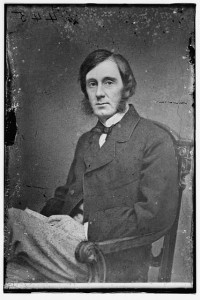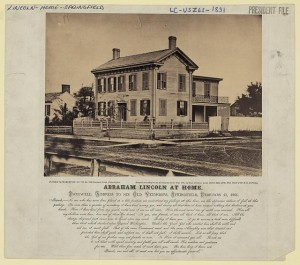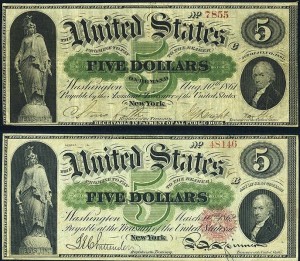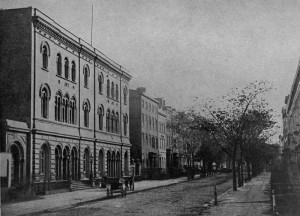The Son of the South provides a great service by serving up digitized copies of Harper’s Weekly for the entire duration of the American Civil War. The February 1, 1862 issue includes an article about how the Union political leaders were trying to develop schemes to fund the war and deal with the growing public debt. The First Legal Tender Act was enacted on February 25, 1862.
Also on the same page is a column by “The Lounger”. It is said that “The Lounger” was one of the pseudonyms of George William Curtis, a Rhode Island-born journalist who was also involved in forming the Republican party. He actively campaigned for Fremont in 1856 and “was soon recognized not only as an effective public speaker, but also as one of the ablest, most high-minded, and most trustworthy leaders of public opinion.” (Wikipedia)
In his February 1st column Curtis opined on a number of topics. He anticipated Doris Kearns Goodwin by over a century by giving President Lincoln kudos for including Democrats in his administration:
THE President certainly gives proof of the fact that he regards the question of the suppression of the rebellion to be a purely national question, entirely independent of party. The policy of his Administration, falling upon so critical a time, has been to gather to the national standard all loyal men, whether they were Republicans or Democrats. The peril of the nation annihilates party, and whoever forgets that fact, the President does not. He is the most purely national and loyal Chief Magistrate we have had for many a year.
Curtis moved on to the question of the growing war debt and the importance of northern citizens being taxed to pay for the war:
The question of the tax is simply, Are we in earnest? Are we willing to know that the expense is vast, and to pay it honestly, every cent? It is easy enough to print a myriad reams of prettily engraved notes, and to agree to take them for money. But they are not money; and, like all outer lies, they will come to naught, and bring us to confusion. Are we in earnest ? For if we are, we shall gladly economize, and economize again. If we are, we shall be willing enough to be poor, but never to be dishonored.
In the “penny wise pound foolish” department The Lounger thought the federal government should not cut funding for the Coast Survey because much of the Union success in the war so far had been along the southern coast (excluding Fort Sumter); also, for the North to continue to make use of its naval superiority it had to have accurate knowledge of its targets. And Curtis saw the survey as an investment in science and civilization while the North went about its brutal business of putting down the rebellion:
Besides, we all naturally wish that we may, as far as possible, avoid the usual brutalizing effects of war. It is its tendency to crush all purely scientific and intellectual progress and life. In our great desire to throttle rebellion we may forget that it is therefore doubly necessary that all humanizing and civilizing processes should be continued. It is our constantly widening and deepening intelligence which confirms our political advance. Without knowledge Democracy is a delusion. Even Great Britain, in her long French wars, fighting for existence, as she now confesses, did not discontinue this kind of work. Why should we? The Coast Survey is invaluable for the immediate purpose of the war. It is a monument of our consciousness of the value of science to a nation. Its expense is small. Is its suspension a cheap economy?
The Lounger’s column also included anticipation of a major Union offensive and a discussion of some of the contractor abuses while Simon Cameron ran the War Department. Curtis supported the abolition of the franking system. He closed with praise for Joseph Cogswell who was retiring from his job running New York’s Astor Library.




